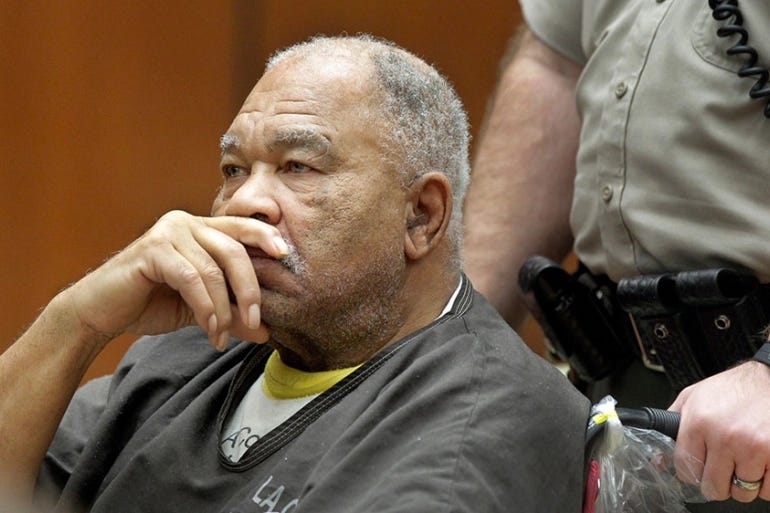Here is a button where you can subscribe to this newsletter now, if you have not previously done so. I do hope that you enjoy it.
Of all the changes that were made during my now-12-years-gone tenure at Deadspin—adding comments, hiring staffers other than me, jumping posts to a new page after two paragraphs, something that seriously was not done when the site first launched—the one I disliked the most was Nick Denton’s decision to include the total number of pageviews each story had received, right there next to the headline.
I not only hated this change, I didn’t even slightly understand it. What was the purpose of showing precisely how many people were reading a story to the actual people reading the story? Why would someone explicitly state how many, or how few, readers a website had to the general public? I could understand why advertisers would want to know that information. But I had always thought one of the benefits Deadspin had in the beginning is that there was this air of mystery about it. Who was the person running this site? How long has it been here? Am I the only person reading it, or are there millions of people doing so? Not revealing how many people were reading a site, leaving the audience in the dark about how many of them there were, worked twice over, from my perspectie: It allowed readers to feel like they were a part of some massive movement while also feeling like the site was their own little secret.
And, personally, I did not want to know the exact figure myself. My golden rule, not just at Deadspin but at anywhere I have ever written, is that I do not want to know, and I will beg my editors not to tell me, how many people are reading or clicking on the stories I’ve written. No traffic numbers, no engagement, no underlying metrics: Just let me live in ignorance. The Big Board, the massive traffic tracker that Gawker famously installed shortly after I left Deadspin (and which is now common in newsrooms everywhere), is my living nightmare. There is no number you can give me that would make me happy. Every number is both too high and too low; there are too many people reading my stories, or not enough. It is exhausting enough just to make all this shit; I don’t have the energy or, frankly, the interest to constantly track how “well” they’re “performing.” I am happy (and undeniably privileged) to live unaware, because staring at the numbers all the time, down that path madness lies. I know that a whole industry of media runs (wobbly, sure, but it does run) on the idea that every piece is supposed to maximize pageviews and engagement. But if I thought that way all the time, I don’t how it would ever be any fun to make anything. I am aware of the business aspect, sure, and I trust that if no one ever reads anything that I write, the people who pay me to write all those things will let me inform me of such by no longer paying me to write all those things. I didn’t get into this to become the most well-read writer in the world. I got into this to write things for a living. Sure, every writer always more people to read their stuff. But I don’t know, or particularly want to know, any other way to do so other than just making more of it, and making it good.
And I do believe, if I may be dogmatic for a moment, that these numbers, and the desperate, heaving industry-wise obsession with them (mainly because we started letting the money people into the editorial meetings, which accelerated trends that were already working against the news business in the first place), is the primary reason the Internet has become so terrible. When I first signed up for Twitter, nearly 12 years ago when I was assigned a story on the company for New York, the first thing I noticed was how strange it was that it emphasized the number of people each person had following them. Twitter, it was clear, had created this truly incredible communication device. I mean, you can type a few words into your phone, push a button, and in about two seconds those words can be read in Australia, or on the moon. Holy shit! That’s amazing! But rather than build the service around this revolutionary breakthrough of the possibilities of human communication, they instead decided to make it a fake exercise in earning imaginary clout, leading us into this desperate, forever doomed search to constantly be looking for more people, more, more, never enough people, to listen to us. They basically attempted to monetize loneliness.
Imagine how much better Twitter would be, how much better the world would be, if there were no numbers on the site. No number of followers, no number of retweets, no number of likes. You might have four billion followers; you might have 400; you have no idea. Doesn’t this seem like you’d be more likely to say what you mean, what you really believe, than not? Wouldn’t you be less likely to say whatever it takes to get attention, to get that sad little fleeting endorphin rush of one of the faceless people in the void giving a “heart” of validation for a millisecond? Wouldn’t it be better? And isn’t this the problem of the entire Internet? And thus the world?
I’ve always felt that you should write as if you have a billion people reading you, and also as if you have none. But sometimes I worry that I might be more comfortable being closer to the latter than the former.
***************
This week, I wrote a Medium essay about risk-assessment and the pandemic. I think it turned out well, I was pleased with it, it said what I wanted it to say, and then I moved onto something else because I’m always moving onto something else, there’d be no way to get all this done otherwise. But then something surprising happened: Nate Silver Tweeted about it.

Nate’s an old baseball guy, and I’ve known him for a long time, but we’re not like close friends or anything: I’m an admirer of his work and worldview, work I’ll say has helped keep me level pretty much across the board in 2020, but we’ve never worked together or anything. I was glad he liked my piece. It was a good piece.
What I had not anticipated is what happens when Nate Silver—who was getting yelled at by the President on the campaign trail four weeks ago and having Twitter fights with his idiot son just last week—mentions something you wrote on Twitter. What it does it turn your little column into a whole deal. All the work I was doing on Tuesday essentially came to a stop, because suddenly there were a thousand debates about the topic that I was now expected to individually weigh in on. Should outdoor eating be encouraged? Should kids be back in school? Was Will too dismissive of single people? Why does he hate Trump so much? Is Biden going to make everyone wear masks? What about our freedoms? Did I leave the iron on? And on and on.
Now: This is the sort of thing a writer is supposed to want. They write a piece in which they take a stance on an issue, and then the audience, engaged by the topic, weighs in with views of their own. A discussion ensues, a flame that began with the spark of an idea and a writer then using their imagination and desire to be heard to fill an empty page with the exploration of that initial notion. This should be the dream. This should be the point.
But I must confess that I hated the whole experience. I hated that so many people had incredibly strong opinions about it despite clearly having not read it, but that wasn’t really it: That’s the case with everything, all the time, after all. Deep down, I think I actually hated the exposure. I hated that the fact that this many people discussing this little piece I just typed into my laptop made my heart race, made me anxious, made me feel like I’d done something wrong that I didn’t know about and I was soon going to get in trouble for it. I hated that I had to drop all the other writing I had planned on doing that afternoon because when a piece gets as big as that one did it becomes something you have to deal with. And I hated that I couldn’t find enough joy in having something I created become popular and a topic of considerable conversation, interesting conversation. The whole thing just made me antsy. Which is a weird reaction for a writer to have when a bunch of people are reading something they wrote.
Which brings as back to Deadspin. The main reason I left Deadspin was because I was offered a job by Adam Moss to work for New York magazine, an editor and a publication I deeply admired and was honored to be even be thought worthy of. But another primary reason was because it was clear that Deadspin, after the initial surge of creation and imagination, was going to have to get bigger. Not indie band bigger, but full-on, scaleable, In The Digital Content Business bigger. There’s nothing wrong with that, of course: One of the reasons I’ve benefited from being the guy who started Deadspin for so many years is because the people who came after me made it massive enough to continue to matter. But I had no actual interest myself in it being massive. I just wanted to write the site the way I wanted to write it and to otherwise be left alone. It was obvious the site was growing too quickly for that to be a realistic job expectation. So I left. I didn’t want to be a manager. But if I’m really being honest: I didn’t want to be a personality. I didn’t like the Bissinger incident, I didn’t like being some sort of avatar for the late aughts sports internet, and I didn’t like, all told, going from being read by zero people (which was roughly how many people were reading me before Deadspin) to millions of people in the span of about a year. I felt like I needed to get off the bucking bronco before it sent me careening into a wall.
Twelve years later, I still struggle with this, and it’s important that I figure it out soon, considering I’ve got a novel I need to start persuading people to buy. I want people to read my work; I don’t want to just be talking to myself, after all. But I don’t want it to become too well-read, or, maybe a better, more accurate way to put it, I don’t want to want it to become too well-read. Because wanting it too badly takes away from the inherent truth of the thing. If you’re just trying to make the numbers go up, I truly believe your work is likely to be more performative than inherently honest. If I watch the numbers, if I get too excited about individual pieces that get around, I lose touch with what I got into in this for in the first place: To be heard, sure, but mostly to be understood. I want to write in good faith for people who will read in good faith. That probably puts an inherent lid on the audience right there.
So, what do I want? I want to be read by less than a billion people, but more than zero. And I don’t want anyone to ever tell me which one I’m closer to.
Here is a numerical breakdown of all the things I wrote this week, in order of what I believe to be their quality.
Confessions of a Pandemic Risk-Taker, Medium. The aforementioned piece.
The NFL Is Just Going to Fight Through This, New York. In a moral-neutral universe, this is probably a smart decision. We don’t live in that universe, though. (Wait, do we?)
What If Albert Pujols Had Stayed in St. Louis? MLB.com. This is an occasional new What If? feature that I’ll be doing that has some staying power, I think.
The Courtroom Feeds Are Going Viral, Medium. If you want a viral video, just turn on C-SPAN and wait.
This Week in Genre History: Edward Scissorhands, SYFY Wire. Oh, Johnny Depp, what happened? This would have been a massive 30th-anniversary retrospective movie if it weren’t for him.
Free Agent Suitor Power Rankings: D.J. LeMahieu, MLB.com. Great fit in St. Louis, but there’s no way.
Melissa McCarthy Movies, Ranked and Updated, Vulture. With Superintelligence.
People Who Made 2020 More Tolerable: Volume One, Medium. An every-Friday feature until the end of the year.
The Thirty: The Biggest Free Agents After 2021, MLB.com. Ha, like we’ll all still be alive then.
PODCASTS
Grierson & Leitch, we discuss Ma Rainey’s Black Bottom, Small Axe: Lovers Rock and the truly terrible Stardust.
People Still Read Books, talking with David Daley, author of “Unrigged: How Americans Battled Back To Save Democracy.”
Waitin' Since Last Saturday, reviewing the South Carolina game, previewing the Vanderbilt game.
LONG STORY YOU SHOULD READ THIS MORNING … OF THE WEEK
“How America’s Most Prolific Serial Killer Went Undetected for 40 Years,” Wesley Lowery, Hannah Knowles and Mark Berman, The Washington Post. Wesley Lowery is writing incredible stories for The Washington Post and he doesn’t even work there anymore.
ARBITRARY THINGS RANKED, WITHOUT COMMENT, FOR NO PARTICULAR REASON
Sopranos Seasons
Season One
Season Six
Season Five
Season Three
Season Four
Season Two
(But they’re all great.)
ONGOING LETTER-WRITING PROJECT!
Get them to me! I miss you. Write me at:
Will Leitch
P.O. Box 48
Athens GA 30603
CURRENTLY LISTENING TO
“Divorce Song,” Liz Phair. You know, Liz Phair is still so great. This album remains perfect and while it zaps me back to 1993 the second I hear it, every time, it also eternal. She’s just the best. (Also she follows me on Twitter. Probably a Cardinals fan.)
Here’s your next singer-songwriter superstar:
Have a great weekend, all.
Best,
Will







I commented on a sports blog this week that I was disappointed in their lack of coverage in a particular area and I was shouted down in the comments by a bunch of people saying that area I was talking about wouldn't get enough clicks. And while I understand that clicks has to inform coverage in some way... it must not and cannot DRIVE coverage. What drives coverage must be an underlying set of values, a worldview, a perspective, a non-neutral set of assumptions about what is important and worth discussing, regardless of whether anyone reads it. We're losing that perspective in general all across the media. Perhaps we've already lost it entirely and I'm just screaming into the void.
Thanks, as always, for your trenchant perspective, Will.
Will Leitch is the best thing I see online! I only wish I could get more content from him up here in the "wilds" of Nova Scotia!